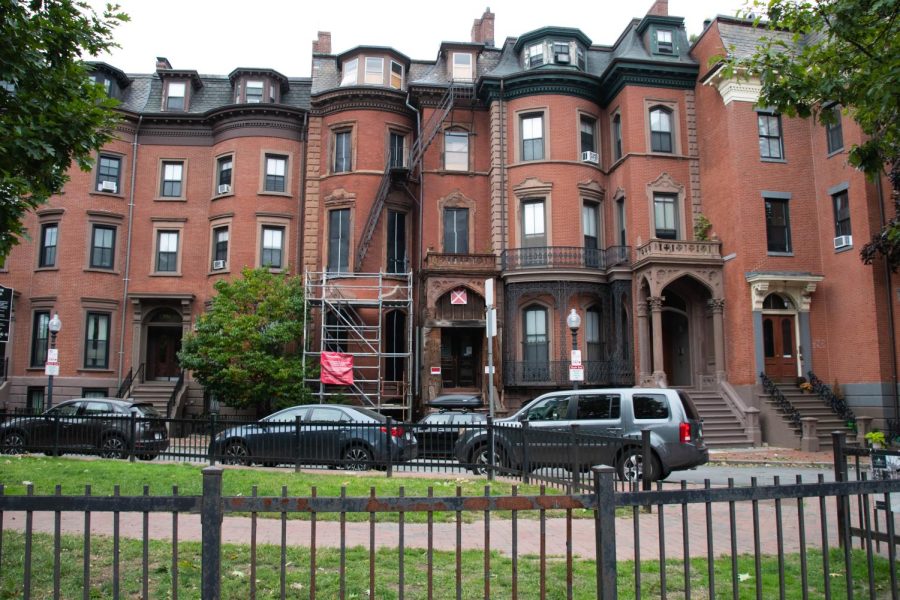Roxbury-based organization shines light on Boston’s Black female history
The League of Women for Community Service headquarters located at 558 Massachusetts Ave. The building is currently undergoing restoration.
October 13, 2022
At 558 Massachusetts Ave. sits a building holding value for Boston’s Black, female population — it’s the headquarters for the League of Women for Community Service, or LWCS — which has been owned by the organization since 1920.
The building was initially purchased on behalf of the League by a Black woman, making it notable as it preceded the mid-twentieth century Civil Rights Movement in the United States.
Maria Baldwin, the woman who originally purchased the building, was a co-founder and the first president of the LWCS. Beyond her contributions to the League, Baldwin had an extensive career as an educator in Cambridge.
“[Baldwin was] the first Black person to be named the head of an integrated school, which is now called the Maria Baldwin School,” said Kalimah Redd Knight, the current LWCS president. “She was a talented educator and speaker and a devoted member of the [Boston] community.”
Her commitment to this community is observable in much of the League’s early programs, which were far ranging in their focus.
“During the Great Migration, the Black population was leaving the South with very few resources, and the League provided support [for the large number of people who landed in Boston],” said Johnnie Hamilton-Mason, a professor at Simmons University and an inaugural visiting scholar with King Boston, a nonprofit currently conducting research using LWCS archives.
Education inequality was one area the founders felt a particularly strong desire to intervene. Redd Knight said Baldwin wanted to relieve Black, female students of the extra barriers they encountered as a result of their identity and was largely inspired by her encounters as both a student and teacher.
“African American women … were board[ed] at the League … because they were not able to stay on campuses in the Boston area,” Hamilton-Mason said.
One of these students included Coretta Scott, who attended the New England Conservatory of Music, before she met her husband Martin Luther King Jr. and took on an important role within the Civil Rights Movement.
Equitable and accessible education for Boston’s Black, female population continues to be an area of focus for the League, said Redd Knight. The organization’s Massachusetts Avenue headquarters, where it offers Black graduate students affordable housing under the Virginia Glennon Graduate Students Leadership Scholars Program, is currently undergoing a large-scale restoration project that represents the effort to preserve the history of the nineteenth century building and pay homage to its past. Upon its completion, the League will resume the boarding program. Live updates about the status of this project are regularly posted on the LWCS Twitter, although its end date is currently undetermined.
“I draw a lot of inspiration from the founders,” Redd Knight said. “A lot of our goal is to hold up their work and amazing legacy.”
Hamilton-Mason’s research presents another example of the desire of League members and other individuals who are closely affiliated to celebrate the accomplishments of the LWCS amid highly challenging times for Black people in the United States.
“They were … everyday leaders, women who viewed that it was their obligation to contribute to lifting the people of Boston while they lifted themselves,” Hamilton-Mason said. “What I’m doing in my research is connecting the kind of organizing they did, which was decentralized leadership, to … the kind of leadership model that Black Lives Matter has.”
A group of Northeastern University students are contributing their own efforts to preserving and amplifying the League’s history. Régine Michelle Jean-Charles, the director of Africana studies and Dean’s professor of culture and social justice at Northeastern, introduced a Black feminist studies (WMNS 2325) course this fall which provides this opportunity.
“The class is about African American history and Black women in Massachusetts,” Jean-Charles said. “What have Black women’s contributions to the city been and how do we trace them throughout history?”
The class has a service learning component and involves working with three local, Black women led organizations, including the LWCS.
“[Redd Knight] came up with the women she wants [the students] to research and develop biographies for which involves using LWCS archives but also going beyond to create almost a digital map of who these women are so you can see the ways in which all of these Black women throughout history are connected to the League,” Jean-Charles said.
Additionally, the LWCS grants the annual Maria L. Baldwin Scholarship to two or more female college-bound students of African American descent from the Roxbury and Dorchester neighborhoods, another example of the League’s commitment to making higher education more accessible. The goal is to provide an avenue to education to a community that did not always receive much assistance.
“[558 Mass Ave.] was possibly the only place that was acceptable for Black women to congregate and support each other outside of the church,” Hamilton-Mason said.
The important historical role of Boston’s Black female intellectual population has been reinforced by the work done by the LWCS.
“[Black female academics] don’t exist in a vacuum, they’re coming out of a long history of Black women’s service to the community and commitment to education,” Jean-Charles said. “We stand on the shoulders of Black women educators who have done this work for generations.”


















